J. R. R. Tolkien
Appearance
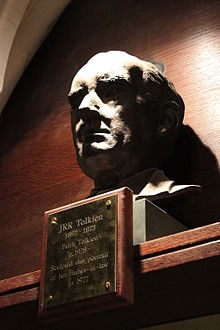
John Ronald Reuel Tolkien (January 3 1892 – September 2 1973) was an English writer, poet, philologist, and university professor, most famous for his classic high fantasy works.
- See also:
- The Hobbit (1937)
- The Lord of the Rings
- The Fellowship of the Ring (1954)
- The Two Towers (1954)
- The Return of the King (1955)
- Appendices to The Lord of the Rings (1955)
- The Silmarillion (1977)
- The Hobbit (1977 animated film based upon his novel)
- The Lord of the Rings (1978 animated film based upon his novel)
- The Lord of the Rings (films based upon his novel)
- The Hobbit (films based upon his novel)
- The Lord of the Rings: The War of the Rohirrim (2024 anime film based upon characters from his novel)
Quotes
[edit]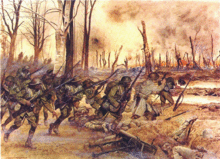



- Wars are not favourable to delicate pleasures.
- "A Secret Vice" (lecture, 1931) published in The Monsters And The Critics And Other Essays (1983), edited by Christopher Tolkien
- The significance of a myth is not easily to be pinned on paper by analytical reasoning. It is at its best when it is presented by a poet who feels rather than makes explicit what his theme portends; who presents it incarnate in the world of history and geography, as our poet has done. Its defender is thus at a disadvantage: unless he is careful, and speaks in parables, he will kill what he is studying by vivisection, and he will be left with a formal or mechanical allegory, and what is more, probably with one that will not work. For myth is alive at once and in all its parts, and dies before it can be dissected.
- "Beowulf: The Monsters and the Critics" (1936), p. 14
- My advice to all who have the time or inclination to concern themselves with the international language movement would be: 'Back Esperanto loyally.'
- "A Philologist on Esperanto" in The British Esperantist (May 1932).
- Years later, in an incomplete draft of a letter (1956; quoted more extensively below) he stated that Esperanto and other constructed languages like Volapuk, Ido and Novial were "dead, far deader than ancient unused languages, because their authors never invented any Esperanto legends." - It remains unclear why the authors of Volapuk, Ido or Novial should invent Esperanto legends.
- Nearly all marriages, even happy ones, are mistakes: in the sense that almost certainly (in a more perfect world, or even with a little more care in this very imperfect one) both partners might be found more suitable mates. But the real soul-mate is the one you are actually married to.
- Letter to Michael Tolkien (March 1941)
- There was a solemn article in the local paper seriously advocating systematic exterminating of the entire German nation as the only proper course after military victory: because, if you please, they are rattlesnakes, and don't know the difference between good and evil! (What of the writer?) The Germans have just as much right to declare the Poles and Jews exterminable vermin, subhuman, as we have to select the Germans: in other words, no right, whatever they have done.
- Letter (September 1944)
- Well, the first War of the Machines seems to be drawing to its final inconclusive chapter — leaving, alas, everyone the poorer, many bereaved or maimed and millions dead, and only one thing triumphant: the Machines. As the servants of the Machine are becoming a privileged class, the Machines are going to be enormously more powerful. What's their next move?
- Letter to his son, Christopher (30 January 1945); published in The Letters of J.R.R. Tolkien (1981), Letter 96
- That story was the only thing I have ever done which cost me absolutely no pains at all. Usually I compose only with great difficulty and endless rewriting. I woke up one day (more than 2 years ago) with that odd thing virtually complete in my head. It took only a few hours to get down, and then copy out.
- About "Leaf by Niggle", in a letter to Stanley Unwin (18 March 1945)
- You can make the Ring an allegory of our own time, if you like: an allegory of the inevitable fate that awaits all attempts to defeat evil power by power. But that is only because all power magical or mechanical does always so work.
- Letter to his publisher (31 July 1947); published in The Letters of J.R.R. Tolkien (1981), Letter 109
- "The Shire" is based on rural England and not any other country in the world... The toponymy of The Shire...is a "parody" of that of rural England, in much the same sense as are its inhabitants: they go together and are meant to. After all the book is English, and by an Englishman, and presumably even those who wish its narrative and dialogue turned into an idiom that they understand, will not ask of a translator that he should deliberately attempt to destroy the local colour.
- Letter to Rayner Unwin (3 July 1956), quoted in The Letters of J.R.R. Tolkien (1981), p. 250
- I should say that, in addition to my tree-love (it was originally called The Tree), it arose from my own pre-occupation with the Lord of the Rings, the knowledge that it would be finished in great detail or not at all, and the fear (near certainty) that it would be 'not at all'. The war had arisen to darken all horizons. But no such analyses are a complete explanation even of a short story...
- About "Leaf by Niggle", in a letter to Caroline Everett (24 June 1957)
- I am in fact a Hobbit (in all but size). I like gardens, trees, and unmechanized farmlands; I smoke a pipe, and like good plain food (unrefrigerated), but detest French cooking; I like, and even dare to wear in these dull days, ornamental waistcoats. I am fond of mushrooms (out of a field); have a very simple sense of humor (which even my appreciative critics find tiresome); I go to bed late and get up late (when possible). I do not travel much.
- Letter to Deborah Webster (25 October 1958)
- I have the hatred of apartheid in my bones...
- Valedictory address to the University of Oxford (1959)
- Gueroult: I thought that conceivably Midgard might be Middle-earth or have some connection?
Tolkien: Oh, it is; they're the same word. Most people have made this mistake of thinking Middle-earth is a particular kind of Earth or is another planet of the science-fiction sort, but it's simply an old-fashioned word for this world we live in, as imagined surrounded by the ocean.
Gueroult: It seemed to me that Middle-earth was, in a sense, as you say, "this world we live in", but this world we live in at a different era.
Tolkien: No, at a different stage of imagination, yes.- Interviewed by Denys Gueroult for the BBC (January 1965); excerpts played on the BBC Radio 4 programme "Now Read On" (16 December 1970) [1]
- It is impossible for an author still writing to be fair to another author working along the same lines. At least I find it so. In fact I dislike Dune with some intensity, and in that unfortunate case it is much the best and fairest to another author to keep silent and refuse to comment.
- Letter to John Bush, 12 March 1966. Quoted in "Tolkien's Library: An Annotated Checklist" by Oronzo Cilli
- Every morning I wake up and think good, another 24 hours' pipe-smoking.
- A rare interview with Tolkien (1966) — "Tolkien's shire" by John Ezard, The Guardian (28 December 1991)
- If you really come down to any large story that interests people – holds the attention for a considerable time ... human stories are practically always about one thing, aren't they? Death. The inevitability of death.
- Tolkien in Oxford (1968), a BBC 2 television documentary (at 21:49)
- It gives me great pleasure, a good name. I always in writing start with a name. Give me a name and it produces a story, not the other way about normally.
- 1964 BBC Interview with Denys Gueroult, first broadcast on the BBC Radio 4 programme "Now Read On" (January 1971)
- I do so dearly believe that no half-heartedness and no worldly fear must turn us aside from following the light unflinchingly.
- Letter to Edith, as quoted in J. R. R. Tolkien: a biography (1977) by Humphrey Carpenter, p. 66
- "I wish life was not so short," he thought. "Languages take such a time, and so do all the things one wants to know about."
- "Alboin Errol", in The Lost Road (1987). Compare this with "The lyf so short, the craft so longe to lerne" by Geoffrey Chaucer
- "[M]y friend Professor Tolkien asked me the very simple question, 'What class of men would you expect to be most preoccupied with, and most hostile to, the idea of escape?' and gave the obvious answer: jailers."
- Quoted by C. S. Lewis. "On Science Fiction". Of Other Worlds: Essays and Stories. Houghton Mifflin Harcourt (2002). p. 67. ISBN 978-0-15-602767-0.
- I liked him better than all the other characters[…]
- Referring to Gollum. From J. R. R. Tolkien: An Audio Portrait, BBC Radio Collection (2001), ISBN 0-563-53692-6. CD 1, track 17. Originally from the 1964 interview with Denys Gueroult, first broadcast in 1971.
- [C]ontrary to most people, I think that touching your cap to the squire may be damn bad for the squire but it's damn good for you.
- Originally from the 1964 interview with Denys Gueroult, first broadcast in 1971. Excerpted in J. R. R. Tolkien: An Audio Portrait, BBC Radio Collection (2001), ISBN 0-563-53692-6. CD 2, track 10.
Mythopoeia (1931)
[edit]

- Written following a discussion with C. S. Lewis and Hugo Dyson at Magdalen College, Oxford which took place on the night of 19 September 1931. First published in the second edition of Tree and Leaf (1988), ed. Christopher Tolkien. · Full text online

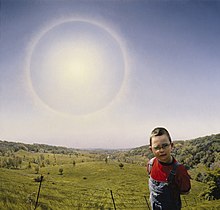
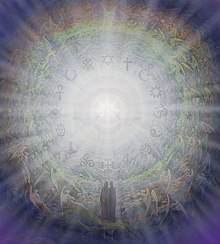
- Yet trees are not 'trees', until so named and seen
and never were so named, till those had been
who speech's involuted breath unfurled,
faint echo and dim picture of the world
- The heart of man is not compound of lies,
but draws some wisdom from the only Wise,
and still recalls him. Though now long estranged,
man is not wholly lost nor wholly changed.
- All wishes are not idle, nor in vain
fulfilment we devise — for pain is pain,
not for itself to be desired, but ill;
or else to strive or to subdue the will
alike were graceless; and of Evil this
alone is deadly certain: Evil is.
- Though all the crannies of the world we filled
with elves and goblins, though we dared to build
gods and their houses out of dark and light,
and sow the seeds of dragons, 'twas our right
(used or misused). The right has not decayed.
We make still by the law in which we're made.
- In Paradise perchance the eye may stray
from gazing upon everlasting Day
to see the day-illumined, and renew
from mirrored truth the likeness of the True.
Then looking on the Blessed Land 'twill see
that all is as it is, and yet made free:
Salvation changes not, nor yet destroys,
garden nor gardener, children nor their toys.
Evil will not see, for evil lies
not in God's picture but in crooked eyes,
not in the source but in malicious choice,
and not in sound but in the tuneless voice.
In Paradise they no more look awry;
and though they make anew, they make no lie.
Be sure they still will make, not being dead,
and poets shall have flames upon their head,
and harps whereon their faultless fingers fall:
there each shall choose for ever from the All.
On Fairy-Stories (1939)
[edit]

- Originally given as an Andrew Lang Lecture at the University of St. Andrews on 8 March 1939, and published in Essays presented to Charles Williams in 1947. It was republished with minor alterations in Tree and Leaf in 1964, in The Tolkien Reader in 1966, and in The Monsters and the Critics and Other Essays in 1983. Tolkien On Fairy-stories, an expanded edition containing the essay, unpublished manuscripts, background material, contemporary reports, and notes and commentary, edited by Verlyn Flieger and Douglas A. Anderson, was published by HarperCollins in 2008.
- The mind that thought of light, heavy, grey, yellow, still, swift also conceived of magic that would make heavy things light and able to fly, turn grey lead into yellow gold, and the still rock into a swift water. If it could do the one, it could do the other; it inevitably did both. When we can take green from grass, blue from heaven, and red from blood, we have already an enchanter's power.
- In such 'fantasy', as it is called, new form is made; Faerie begins; Man becomes a sub-creator.
- Small wonder that spell means both a story told, and a formula of power over living men.
- The story-maker proves a successful 'sub-creator'. He makes a Secondary World which your mind can enter. Inside it, what he relates is 'true': it accords with the laws of that world. You therefore believe it, while you are, as it were, inside. The moment disbelief arises, the spell is broken; the magic, or rather art, has failed.
- I desired dragons with a profound desire. Of course, I in my timid body did not wish to have them in the neighbourhood, intruding into my relatively safe world, in which it was, for instance, possible to read stories in peace of mind, free from fear. But the world that contained even the imagination of Fáfnir was richer and more beautiful, at whatever cost of peril.
- Fantasy is a higher form of Art, indeed the most nearly pure form, and so (when achieved) the most potent.
- Fantasy remains a human right: we make in our measure and in our derivative mode, because we are made: and not only made, but made in the image and likeness of a Maker.
- I have claimed that Escape is one of the main functions of fairy-stories, and since I do not disapprove of them, it is plain that I do not accept the tone of scorn or pity with which 'Escape' is now so often used. Why should a man be scorned if, finding himself in prison, he tries to get out and go home? Or if he cannot do so, he thinks and talks about other topics than jailers and prison-walls? The world outside has not become less real because the prisoner cannot see it.
- We find it difficult to conceive of evil and beauty together. The fear of the beautiful fay that ran through the elder ages almost eludes our grasp. Even more alarming: goodness is itself bereft of its proper beauty. In Faërie one can indeed conceive of an ogre who possesses a castle hideous as a nightmare (for the evil of the ogre wills it so), but one cannot conceive of a house built with a good purpose – an inn, a hostel for travellers, the hall of a virtuous and noble king – that is yet sickeningly ugly. At the present day it would be rash to hope to see one that was not – unless it was built before our time.
- And lastly there is the oldest and deepest desire, the Great Escape: the Escape from Death. Fairy-stories provide many examples and modes of this … Fairy-stories are made by men not by fairies. The Human-stories of the elves are doubtless full of the Escape from Deathlessness.
- The Gospels contain a fairy-story, or a story of a larger kind which embraces all the essence of fairy-stories. … But this story has entered History and the primary world; … It has pre-eminently the "inner consistency of reality." There is no tale ever told that men would rather find was true, and none which so many sceptical men have accepted as true on its own merits. For the Art of it has the supremely convincing tone of Primary Art, that is, of Creation. ...this story is supreme; and it is true. Art has been verified. God is the Lord, of angels, and of men — and of elves. Legend and History have met and fused.
- The Evangelium has not abrogated legends; it has hallowed them, especially the "happy ending." The Christian has still to work, with mind as well as body, to suffer, hope, and die; but he may now perceive that all his bents and faculties have a purpose, which can be redeemed. So great is the bounty with which he has been treated that he may now, perhaps, fairly dare to guess that in Fantasy he may actually assist in the effoliation and multiple enrichment of creation. All tales may come true; and yet, at the last, redeemed, they may be as like and unlike the forms that we give them as Man, finally redeemed, will be like and unlike the fallen that we know.
Leaf by Niggle (1945)
[edit]- First published in Dublin Review (January 1945); written in 1938 or 1939
- There was once a little man called Niggle, who had a long journey to make. He did not want to go, indeed the whole idea was distasteful to him; but he could not get out of it. He knew he would have to start some time, but he did not hurry with his preparations.
- There was one picture in particular which bothered him. It had begun with a leaf caught in the wind, and it became a tree; and the tree grew, sending out innumerable branches, and thrusting out the most fantastic roots.
- "It's a gift!" he said. He was referring to his art, and also to the result; but he was using the word quite literally.
- "I think we shall have to give the region a name. What do you propose?"
"The Porter settled that some time ago," said the Second Voice. "Train for Niggle's Parish in the bay."
English and Welsh (1955)
[edit]- A lecture given at the University of Oxford, (21 October 1955) published in The Monsters And The Critics And Other Essays (1983), edited by Christopher Tolkien
- To many, perhaps to most people outside the small company of the great scholars, past and present, 'Celtic' of any sort is, nonetheless, a magic bag, into which anything may be put, and out of which almost anything may come. … Anything is possible in the fabulous Celtic twilight, which is not so much a twilight of the gods as of the reason.
- No language is justly studied merely as an aid to other purposes. It will in fact better serve other purposes, philological or historical, when it is studied for love, for itself.
- For myself I would say that more than the interest and uses of the study of Welsh as an adminicle of English philology, more than the practical linguist's desire to acquire a knowledge of Welsh for the enlargement of his experience, more even than the interest and worth of the literature, older and newer, that is preserved in it, these two things seem important: Welsh is of this soil, this island, the senior language of the men of Britain; and Welsh is beautiful.
- The basic pleasure in the phonetic elements of a language and in the style of their patterns, and then in a higher dimension, pleasure in the association of these word-forms with meanings, is of fundamental importance. This pleasure is quite distinct from the practical knowledge of a language, and not the same as an analytic understanding of its structure. It is simpler, deeper-rooted, and yet more immediate than the enjoyment of literature.
- Most English-speaking people … will admit that cellar door is "beautiful," especially if dissociated from its sense (and from its spelling). More beautiful than, say, sky, and far more beautiful than beautiful...Well then, in Welsh, for me cellar doors are extraordinarily frequent, and moving to the higher dimension, the words in which there is pleasure in the contemplation of the association of form and sense are abundant.
The Letters of J. R. R. Tolkien (1981)
[edit]



- I must say the enclosed letter from Rütten and Loening is a bit stiff. Do I suffer this impertinence because of the possession of a German name, or do their lunatic laws require a certificate of 'arisch' origin from all persons of all countries? … I do not regard the (probable) absence of all Jewish blood as necessarily honourable; and I have many Jewish friends, and should regret giving any colour to the notion that I subscribed to the wholly pernicious and unscientific race-doctrine.
- No. 30: Letter to Stanley Unwin (25 July, 1938); Tolkien's German publishers had written to ask him whether he was of "Aryan" origin.
- I regret that I am not clear as to what you intend by 'arisch'. I am not of Aryan extraction: that is Indo-Iranian; as far as I am aware none of my ancestors spoke Hindustani, Persian, Gypsy, or any related dialects. … But if I am to understand that you are enquiring whether I am of Jewish origin, I can only reply that I regret that I appear to have no ancestors of that gifted people. … I have been accustomed, nonetheless, to regard my German name with pride, and continued to do so throughout the period of the late regrettable war, in which I served in the English army. I cannot, however, forbear to comment that if impertinent and irrelevant inquiries of this sort are to become the rule in matters of literature, then the time is not far distant when a German name will no longer be a source of pride.
- One of two draft letters (25 July, 1938) written for Stanley Unwin to select as a response to his German publishers inquiry about his ancestry. The other letter refused to answer altogether on his ancestry; since the quoted letter persists, it seems that the other letter was sent.
- I have in this War a burning private grudge — which would probably make me a better soldier at 49 than I was at 22: against that ruddy little ignoramus Adolf Hitler (for the odd thing about demonic inspiration and impetus is that it in no way enhances the purely intellectual stature: it chiefly affects the mere will). Ruining, perverting, misapplying, and making for ever accursed, that noble northern spirit, a supreme contribution to Europe, which I have ever loved, and tried to present in its true light.
- No. 45: To his son Michael Tolkien (09 June, 1941)
- My political opinions lean more and more to Anarchy (philosophically understood, meaning abolition of control not whiskered men with bombs) … the most improper job of any man, even saints (who at any rate were at least unwilling to take it on), is bossing other men. Not one in a million is fit for it, and least of all those who seek the opportunity.
- No. 52: To his son Christopher Tolkien (29 November, 1943)
- As for what you say or hint of 'local' conditions: I knew of them. I don't think they have much changed (even for the worse). I used to hear them discussed by my mother; and have ever since taken a special interest in that part of the world. The treatment of colour nearly always horrifies anyone going out from Britain, & not only in South Africa. Unfort[unately], not many retain that generous sentiment for long.
- No. 61: To Christopher Tolkien in South Africa (18 April, 1944)
- A story must be told or there'll be no story, yet it is the untold stories that are most moving.
- No. 96: To his son Christopher (30 January 1945)
- The news today about "Atomic bombs" is so horrifying one is stunned. The utter folly of these lunatic physicists to consent to do such work for war-purposes: calmly plotting the destruction of the world! Such explosives in men's hands, while their moral and intellectual status is declining, is about as useful as giving out firearms to all inmates of a gaol and then saying that you hope "this will ensure peace". But one good thing may arise out of it, I suppose, if the write-ups are not overheated: Japan ought to cave in. Well we're in God's hands. But He does not look kindly on Babel-builders.
- No. 102: From a letter to his son Christopher Tolkien (9 August, 1945)
- 'Power' is an ominous and sinister word in all these tales, except as applied to the gods.
- No. 131: letter to Milton Waldman (c. 1951)
- The Lord of the Rings is of course a fundamentally religious and Catholic work; unconsciously so at first, but consciously in the revision. That is why I have not put in, or have cut out, practically all references to anything like 'religion', to cults or practices, in the imaginary world. For the religious element is absorbed into the story and the symbolism.
- No. 142: letter to his friend Robert Murray, S.J. (December 1953)
- Nothing has astonished me more (and I think my publishers) than the welcome given to The Lord of the Rings. But it is, of course, a constant source of consolation and pleasure to me. And, I may say, a piece of singular good fortune, much envied by some of my contemporaries. Wonderful people still buy the book, and to a man 'retired' that is both grateful and comforting.
- No. 165: To Houghton Mifflin Co. (30 June, 1955); also quoted in 'Tolkien on Tolkien' in Diplomat magazine (October 1966).
- It was just as the 1914 War burst on me that I made the discovery that 'legends' depend on the language to which they belong; but a living language depends equally on the 'legends' which it conveys by tradition. … Volapuk, Esperanto, Ido, Novial, &c &c are dead, far deader than ancient unused languages, because their authors never invented any Esperanto legends...
- No. 180: To a Mr. Thompson (incomplete draft of a letter, 1956).
- Most important, perhaps, after Gothic was the discovery in Exeter College library, when I was supposed to be reading for Honour Mods, of a Finnish Grammar. It was like discovering a complete wine-filled cellar filled with bottles of an amazing wine of a kind and flavor never tasted before. It quite intoxicated me; and I gave up the attempt to invent an 'unrecorded' Germanic language, and my 'own language' – or series of invented languages – became heavily Finnicized in phonetic pattern and structure. That is of course long past now. ...
- No. 163: On his discovery of Finnish language, in a letter to W. H. Auden (1955)
- I am doubtful myself about the undertaking. Part of the attraction of the L.R. is, I think, due to the glimpses of a large history in the background: an attraction like that of viewing far off an unvisited island, or seeing the towers of a distant city gleaming in a sunlit mist. To go there is to destroy the magic, unless new unattainable vistas are again revealed. Also many of the older legends are purely 'mythological', and nearly all are grim and tragic: a long account of the disasters that destroyed the beauty of the Ancient World, from the darkening of Valinor to the Downfall of Númenor and the flight of Elendil.
- No. 247: To Colonel Worskett (20 September 1963)
- Years before I had rejected as disgusting cynicism by an old vulgarian the words of warning given me by old Joseph Wright. 'What do you take Oxford for, lad?' 'A university, a place of learning.' 'Nay, lad, it's a factory! And what's it making? I'll tell you. It's making fees. Get that in your head, and you'll begin to understand what goes on.' Alas! by 1935 I now knew that it was perfectly true. At any rate as a key to dons' behaviour. Quite true, but not the whole truth. (The greater part of the truth is always hidden, in regions out of the reach of cynicism.)
- No. 250: To Christopher Tolkien (1 November 1963)
- The unpayable debt that I owe to him [C. S. Lewis] was not "influence" as it is ordinarily understood, but sheer encouragement. He was for long my only audience. Only from him did I ever get the idea that my "stuff" could be more than a private hobby. But for his interest and unceasing eagerness for more I should never have brought The L. of the R. to a conclusion.
- No. 276: To Dick Plotz, 'Thain' of the Tolkien Society of America (12 September 1965)
Quotes about Tolkien
[edit]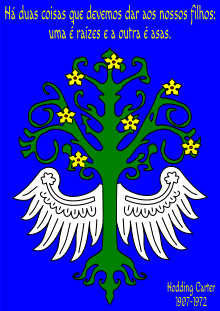
- Alphabetised by author
- Tolkien was, in modern jargon, "right-wing" in that he honoured his monarch and his country and did not believe in the rule of the people; but he opposed democracy simply because he believed that in the end his fellow-men would not benefit from it. He once wrote: "I am not a 'democrat', if only because 'humility' and equality are spiritual principles corrupted by the attempt to mechanize and formalize them, with the result that we get not universal smallness and humility, but universal greatness and pride, till some Orc gets hold of a ring of power—and then we get and are getting slavery." As to the virtues of an old-fashioned feudal society, this is what he once said about respect for one's superiors: "Touching your cap to the Squire may be damn bad for the Squire but it's damn good for you."
- Humphrey Carpenter, J. R. R. Tolkien: A Biography (1977), p. 128
- His commitment to Christianity and in particular to the Catholic Church was total... [A] source of unhappiness in his last years was the introduction of the vernacular mass, for the use of English in the liturgy rather than the Latin he had known and loved since boyhood pained him deeply. But even during an English mass...he would, when receiving communion, experience a profound spiritual joy, a state of contentment that he could reach in no other way. His religion was therefore one of the deepest and strongest elements in his personality.
- Humphrey Carpenter, J. R. R. Tolkien: A Biography (1977), p. 128
- Word-making is one of the roots of fantasy. It reaches its peak in Tolkien, who said he wrote The Lord of the Rings so that they could say "Good morning" in Elvish.
- 1982 interview in Conversations with Ursula Le Guin
- 1830 is about when the novel really got going. Increasingly from then on, literature becomes realism, to the point that you get big problems, like the exclusion of Tolkien, which I think is really insane. He is a major English writer, whether you like him or not. He is excluded not for lack of excellence but through pure genre prejudice-"He's for children," or "He's for people who read fantasy." But he's not. He's a major English author. You do have to have a canon of excellence, for teaching, for criticism, but it's got to be more flexible than it's been, that's really all I'm saying. In a genre like fantasy I'm appalled when I see every three-volume schlock fantasy compared to Tolkien. A lot of readers don't know the original. They need to be taught to see why Tolkien is really a much better writer and will last them the rest of their lives, whereas so-and-so who imitates him won't last the month. I'm not saying there isn't excellence, and that we don't need to teach it.
- 1994 interview in Conversations with Ursula Le Guin
- Fantasy changes the world deliberately, allowing impossible things which science fiction at least pretends not to allow. Yes, I say "what if magic worked, and then...," and "what if there were dragons... yes. Then you just follow out, you just follow the fictional enterprise like any novelist, it seems to me, and the more detailed and accurate you are, the better the book will be. And of course, the tricky thing about imaginative fiction, both science fiction and fantasy, is the coherence of the imagination, because you are making a whole world out of words only. It's all made to hold together. Tolkien is very clear about that in some of his essays. He's the best theorist of fantasy I know, actually, Tolkien himself. The European fantasy theorists, Todorov, and those people, they are terrible, terrible. The works they are talking about always seem so insignificant to me. That's not what I mean by fantasy.
- 2002 interview in Conversations with Ursula Le Guin
- It's one reason I adore Tolkien; he always tells you what the weather is, always. And you know pretty well where north is, and what kind of landscape you're in and so on. I really enjoy that. That's why I like Hardy. Again, you always know what the weather is.
- 1982 interview in Conversations with Ursula Le Guin
- He had been inside language.
- His standard of self criticism was high and the mere suggestion of publication usually set him upon a revision, in the course of which so many new ideas occurred to him that where his friends had hoped for the final text of an old work they actually got the first draft of a new one.
- C. S. Lewis, "Professor J. R. R. Tolkien: Creator of Hobbits and inventor of a new mythology", The Times (3 September 1973)
- The battle between Good and Evil is a theme of much of fantasy. But I think the battle between Good and Evil is fought largely within the individual human heart, by the decisions that we make. It’s not like evil dresses up in black clothing and you know, they’re really ugly. These are some of the things that Tolkien did; he made them work fabulously, but in the hands of his imitators, they become total clichés. I mean the orc-like creatures who always do dress in black and... they’re really ugly and they’ve got facial deformities or something. You can tell that if somebody’s ugly, he must be evil. And then Tolkien’s heroes are all very attractive people and all that, of course, again this became cliché in the hands of the Tolkien imitators.
- George R. R. Martin, interview with TIME Entertainment, Fantasy and History (April 2011)
- Much as I admire Tolkien, and I do admire Tolkien — he’s been a huge influence on me, and his Lord of the Rings is the mountain that leans over every other fantasy written since and shaped all of modern fantasy — there are things about it, the whole concept of the Dark Lord, and good guys battling bad guys, Good versus Evil, while brilliantly handled in Tolkien, in the hands of many Tolkien successors, it has become kind of a cartoon. We don’t need any more Dark Lords, we don’t need any more, ‘Here are the good guys, they’re in white, there are the bad guys, they’re in black. And also, they’re really ugly, the bad guys."
- George R. R. Martin, AssignmentX interview (June 2011)
- "Leaf by Niggle" ends as a comedy, even as a "divine comedy," on more levels than one. But while it looks forward to "divine comedy", it incorporates and springs from a sense of earthly tragedy: failure, anxiety, and frustration.
- Thomas Shippey, on Tolkien's autobiographical allegorical tale "Leaf by Niggle," in J. R. R. Tolkien: Author of the Century (2001), p. 277
- What so impressed me on that first reading was the self-containedness of Tolkien's world. I suppose there are a few novelists who have created worlds that are uniquely their own -- Faulkner, for example, or Dickens. But since their world is fairly close to the actual world, it cannot really be called a unique creation. The only parallel that occurs to me is the Wagner Ring cycle, that one can only enter as if taking a holiday on a strange planet.
- Colin Wilson in Tree By Tolkien, p. 8-9 (1974)
- Dr. Tolkien has little skill at narrative and no instinct for literary form.
- Edmund Wilson, "Oo, Those Awful Orcs!": A review of The Fellowship of the Ring, in The Nation (14 April 1956)
- I believe, that certain people — especially, perhaps, in Britain — have a lifelong appetite for juvenile trash. … You can see it in the tone they fall into when they talk about Tolkien in print: they bubble, they squeal, they coo; they go on about Malory and Spenser — both of whom have a charm and a distinction that Tolkien has never touched.
As for me, if we must read about imaginary kingdoms, give me James Branch Cabell's Poictesme. He at least writes for grown-up people, and he does not present the drama of life as a showdown between Good People and Goblins. He can cover more ground in an episode that lasts only three pages than Tolkien is able to in one of this twenty-page chapters, and he can create a more disquieting impression by a reference to something that is never described than Tolkien through his whole demonology.- Edmund Wilson, "Oo, Those Awful Orcs!": A review of The Fellowship of the Ring, in The Nation (14 April 1956)


